Travel Story «Albanië / Albania»
Albanië / Albania
|
Albania
|
0 Comments
10 October 2019
-
Last Update 21 September 2020
(English translation cf. below)
ROUTE
Bilisht, Korçë, Pogradec, Lin
ALBANIË VROEGER
Ik was al eens eerder in Albanië. Dat was 24 jaar geleden. Destijds was naar Albanië gaan nog een echt avontuur. Zelfs in de reisgids die ik toen gebruikte (uit de respectabele "Blue Guide" reeks) werden er geen doekjes om gewonden. Enkele citaten.
"Men dient nog altijd goed te beseffen dat reizen buiten de steden van het laagland voorbereidingen vraagt die gelijkaardig zijn aan de voorbereidingen vereist voor het reizen in sommige derdewereldlanden."
"De verkeerssituatie is heel slecht en chaotisch, elke dag gebeuren er talloze ongelukken met botsingen tussen voertuigen, vee en de bevolking. De toestand van wegen en voetpaden is dikwijls heel slecht en men moet heel waakzaam zijn voor open duikers, ontbrekende deksels van rioolputten, enz. Voorbij X wordt de weg een slecht spoor dat zelf het meest robuuste voertuig op de proef zal stellen. Op het platteland zijn woeste honden van herders een gebruikelijk risico. Ze worden gefokt om de kuddes tegen wolven te beschermen en mogen onder geen beding benaderd worden."
"De veiligheid in dit deel van de stad is niet erg goed en men dient voorzichtig te zijn. Toeristen moeten er zich bewust van zijn dat banditisme een opleving kent sinds het einde van de communistische tijd. Individueel reizen is niet aangeraden."
"Veel mensen houden er niet van om gefotografeerd te worden, en de bezoeker dient zich op dit vlak tactvol te gedragen in deze streek van Albanië, waar het geloof in het boze oog nog heel courant is."
En meer in het bijzonder over hotels:
"Accommodatie in X kan een probleem zijn. Hotel X is afgeleefd en vuil. Het heeft dringend nood aan renovatie en een bekwaam management, het is niet bepaald een aanvaardbare plek om te verblijven. Te vermijden!"
"Hotel Y: één van de slechtste hotels in het land. Te vermijden!"
"Het vinden van aanvaardbare accommodatie in X kan moeilijk zijn. Hotel X bevindt zich in een povere toestand. Het personeel is onbehulpzaam en het restaurant is vuil. Sommige kamers hebben een geurtje. 's Winters is het er binnen zo koud als aan de Noordpool, zodat men een slaapzak en thermisch ondergoed kan gebruiken. Te vermijden!"
"Het hotel wordt ook gebruikt als het plaatselijke mortuarium, zodat soms lijken kunnen gezien worden in de gang."
"Hotel X is een kleurloze, koude en slecht beheerde betonnen blok, maar toereikend voor een kort verblijf."
ALBANIË NU
Dat was een kwarteeuw geleden. Ondertussen is er gelukkig al veel (ten goede) veranderd. Omdat ik mij in het Griekse Kastoria realiseerde dat ik mij heel dicht bij de grens met Albanië bevond, kon ik niet aan de verleiding weerstaan en besloot ik er eens een kijkje te gaan nemen.
Vroeger, tijdens mijn eerste bezoek aan Albanië, waren er vrijwel geen winkels te zien, op hier en daar een klein en eenzaam straatstalletje na. Elke stad van betekenis beschikte over één groot staatshotel. Er reden betrekkelijk weinig auto's rond, en dan nog hoofdzakelijk gebluste wrakken en afdankertjes uit West-Europa. Af en toe kon ik ook een (wellicht gestolen) luxewagen uit België of Duitsland zien, met de originele nummerplaat er nog op. Uit die tijd dateert de satirische reclameslogan "
Reis naar Albanië, uw auto is daar al".
In de straten en onderweg waren veel oudere mannen te zien die de traditionele witte fez droegen. Deze keer heb ik op drie dagen slechts één man gezien met dit typische hoofddeksel. Tijdens mijn vorige reis in Albanië was ik erg op mijn hoede voor de sinistere figuren die ik her en der tegenkwam. Nu leek het er erg veilig en voelde ik mij geen moment ongerust.
Nu waren er in de grotere dorpen en steden werkelijk overal winkels en zaken te zien. In de steden zijn talloze restaurants en hotels. Er zijn geldautomaten in de straten.
Wat mij na binnenkomst in het land meteen opviel, was dat er in Albanië heel véél auto's rondrijden. En dan nog opvallend veel duurdere modellen. Nog nooit zag ik zo veel Mercedes'en. Ook hebben heel wat Albanezen een tweedehandswagen gekocht in Groot-Brittannië, met het stuur aan de andere kant.
In tegenstelling tot Italië, Griekenland en Noord-Macedonië zijn er in Albanië geen klassieke oldtimers in het straatbeeld te zien. Dat komt hoofdzakelijk omdat Albanezen pas sinds 1991 zelf een auto mogen bezitten. Voordien was dat een privilege van de staat.
Na het passeren van de Grieks-Albanese grenspost viel het op dat in Albanië het Latijnse alfabet wordt gebruikt. Ook was er op regelmatige tijdstippen de gebruikelijke geluidsoverlast veroorzaakt door de oproepen tot gebed aan de moskeeën.
Vanaf Bilisht volgde een vrijwel vlakke route tot in Korçë met langs beide kanten van de weg veel appelboomgaarden en maïs- en paprikavelden. Ik had mij mentaal voorbereid op verschrikkelijk slechte wegen, maar tot mijn grote verbazing trof ik een brede en perfecte asfaltweg aan met een ruime vluchtstrook die als fietspad kon dienstdoen. Daar was ik heel blij om want er was zoals reeds gezegd vrij veel en snel autoverkeer. Langs de weg verkochten de boeren hun oogst: aardappelen, ajuinen, kolen, paprika's en appels.
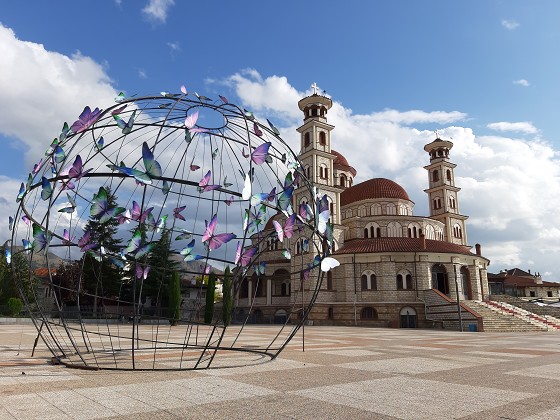
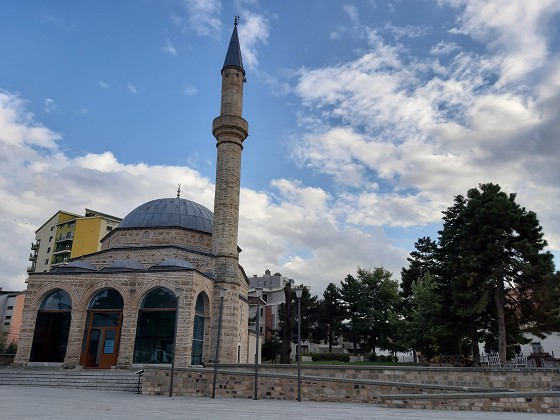
Op dezelfde vlakke (en ietwat saaie) manier ging het verder tot tien kilometer vóór Pogradec, waar van de hoogvlakte via enkele haarspeldbochten werd afgedaald naar het meer van Ohrid. Maar net toen het wat interessanter begon te worden, was er een verkeersopstopping. De weg naar beneden was veel smaller dan op de hoogvlakte zodat een dalende bus en een stijgende vrachtwagen elkaar in een bocht amper konden passeren. Als gevolg hiervan moest ik mee aanschuiven in een file van Mercedes'en (en zwarte wolken uitlaatgassen) en kon ik niet genieten van een snelle afdaling.
Nabij Pogradec werd de sfeer wel meer "Albanees" zoals ik mij dat van vroeger nog kon herinneren: bergen vuilnis, stank, rokende vuurtjes, ...
Vierentwintig jaar geleden was ik al in Pogradec, maar nu herkende ik niet veel meer van de stad. Ik had de indruk dat er in de tussentijd heel veel bijgebouwd was. Het primitieve staatshotel van destijds was nu getransformeerd in één van de duurste en meest luxueuze hotels van de stad. Op de promenade bij het strand stond nog een oude, klassieke villa ... te vervallen. Afgebladderde verf, verroeste balkons, ...
Net als aan de Belgische kust is de betonnen nieuwbouw banaal, lelijk en smakeloos. Dit is een patroon dat overal in Albanië en in Noord-Macedonië kan gezien worden. Mooie traditionele bouwwerken, zowel imposante villa's als bescheiden huisjes, staan te verkommeren terwijl vlakbij lelijke betonnen blokken oprukken. Soms heeft een historisch en geklasseerd gebouw een piekfijn gerestaureerde voorkant, maar als je een kijkje gaat nemen aan de achterkant zie je een bouwval die bijna op instorten staat.
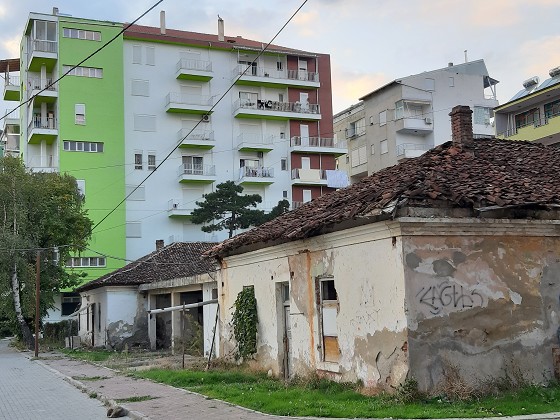
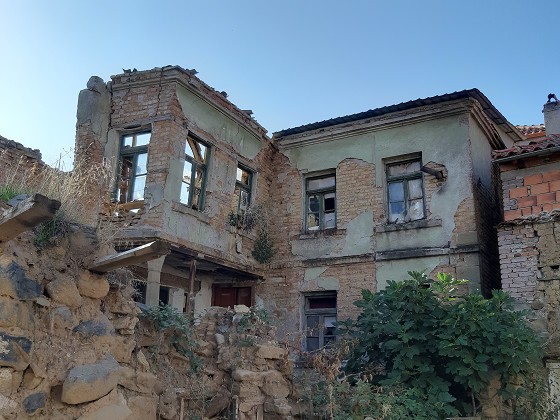
Over "historische" bouwsels gesproken: ik had de indruk dat er minder bunkertjes waren dan vroeger. De paranoïde dictator Enver Hoxha liet tussen 1967 en 1985 zo'n 700.000 bunkers bouwen. In geval van een invasie door een vreemde mogendheid moest elke Albanees zich naar de hem toegewezen bunker reppen en het land verdedigen.
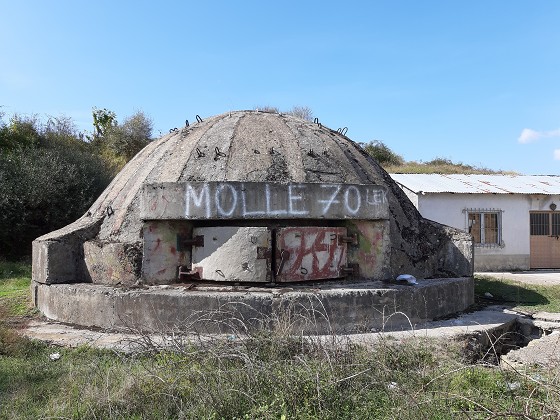
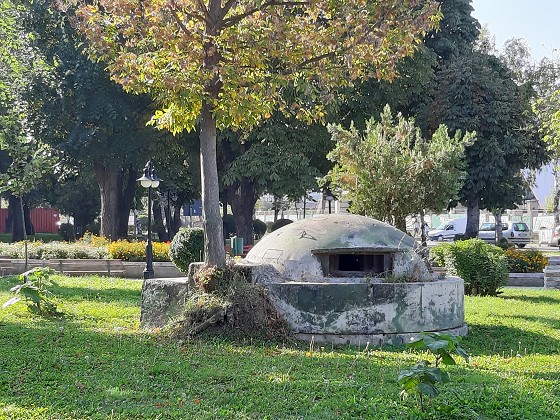
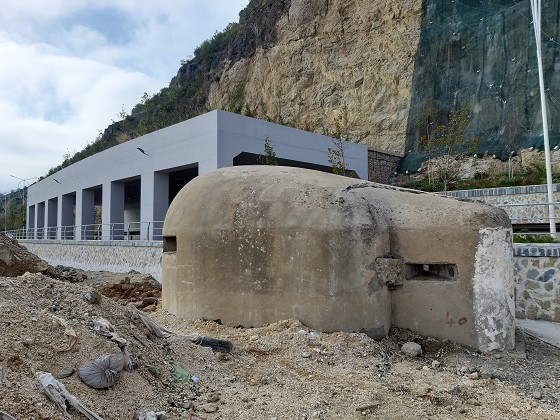
Net als 24 jaar geleden worden de meeste bunkers nog steeds gebruikt als openbaar toilet of vooral voor het dumpen van allerlei afval. Veel van deze bunkers stonden langs de wegen. Wanneer nu wegen gemoderniseerd en verbreed worden, worden de bunkers natuurlijk gesloopt.
Het is gemakkelijk om lacherig te doen over Albanië, maar als het goed is zeg ik het ook. In Italië zag ik een kort en jungle-achtig fietspad. In enkele Griekse steden waren een paar korte stukken fietspad die vooral als parkeerplaats voor auto's gebruikt werden. Maar het beste fietspad tijdens deze reis lag in Albanië.
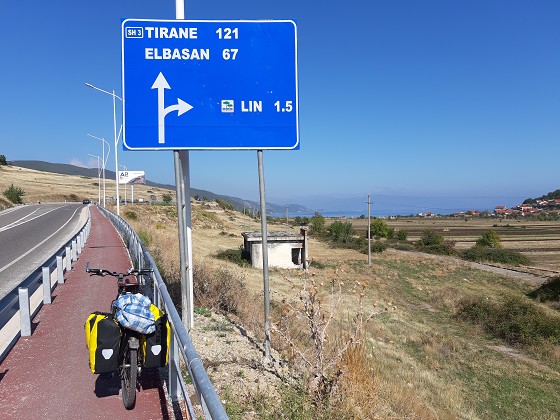
Tussen Pogradec en Lin ligt er over zo'n 20 km een van de weg afgescheiden en goed fietspad. Een kniesoor zou kunnen zeuren dat het 50 cm te smal is om op een comfortabele manier tegenliggers te kunnen passeren. En dat zijn hier niet alleen fietsers, maar ook boeren op wandel met hun koe. Maar Albanië is wel het laatste land waar men een dergelijke inspanning qua verkeersstructuur zou verwachten.
Daar waar het water van het Ohridmeer er in de strandzone van Pogradec maar verdacht en niet al te zuiver uitzag, veranderde dit meteen buiten de stadsgrens. Vanaf dan was het water kristalhelder. In plaats van boeren waren het hier vissers die hun vangst aan de man probeerden te brengen. Eenvoudige vissers verkochten één dode vis of plastic zakjes gevuld met kleine visjes. De meer gesofisticeerde vissers beschikten over een aquarium aan de rand van de weg waarin ze levende vissen hadden.
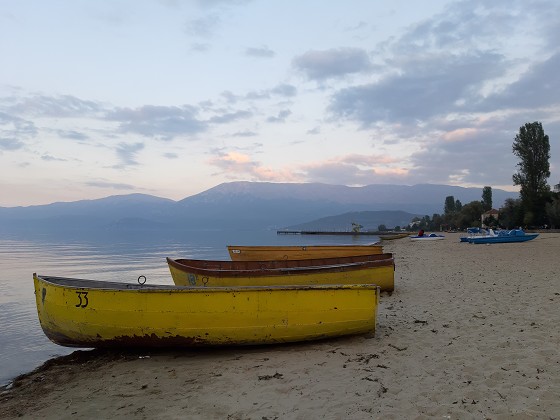
Vanaf Lin werd de vlakte opnieuw verlaten via een haarspeldbochtentraject en klom de weg vervolgens verder tot zo'n 1.000 meter boven de zeespiegel aan de grens met Noord-Macedonië.
TRIVIA
Ik had het in deze blog al over de "Noorse droom". De "Albanese droom" is met een zwarte Mercedes al toeterend over de wegen scheuren en er zo voor te zorgen dat iedereen u gezien heeft. Voor de armere Albanees is er een alternatieve droom: het openen van een eigen car-wash (lavazh in het Albanees), waar de bezitters van een zwarte Mercedes dagelijks langskomen om het stof van hun pronkstuk te spoelen. In sommige stadjes leek het wel of de ene helft van de bevolking met een Mercedes reed, en de andere helft een lavazh uitbaatte.
Op het platteland,
in the middle of nowhere, met slechts enkele schamele boerenhuisjes in de buurt te midden van bonenvelden, zag ik soms de meest kitscherige, smakeloze en bijzonder buitenmaatse kasten van villa's staan, compleet met zuilengangen en namen als "Hotel Art de Vivre". Dan rezen er bij mij wel enkele vragen op. Wie gaat er in hemelsnaam op reis naar een "luxe" hotel omgeven door uitgestrekte velden? En waar komt het geld vandaan om Las Vegas-achtige bouwsels neer te planten in het midden van een negorij?
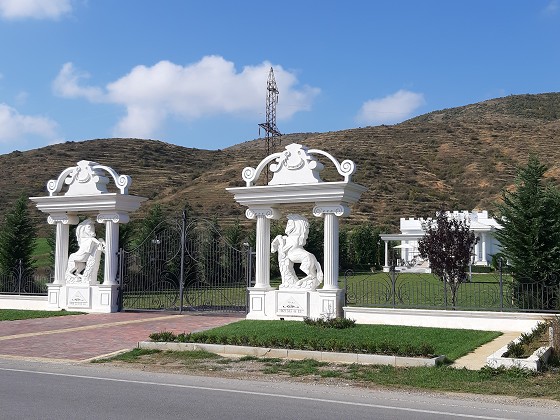
Ik had het al over Albanië vroeger en nu. Een groot aantal dingen lijkt door de jaren heen nog niet te zijn veranderd. Albanese chauffeurs rijden (meestal) te snel en hebben een grote voorliefde voor roekeloze inhaalmanoeuvres, bij voorkeur in een bocht of op een blinde helling. In het verkeer kan men zowel paard of ezel met kar zien als blitse auto's.
In Albanië is er (nog steeds) een totaal gebrek aan hoffelijkheid in het verkeer. Verwacht niet dat auto's stoppen of zelfs maar vertragen voor voetgangers die al in het midden van een zebrapad staan. Een andere auto voorlaten of voorrang verlenen: ondenkbaar in Albanië. Op verkeersvlak (en niet alleen daar) is Albanië nog een derdewereldland waar slechts één wet heerst: de wet van de sterkste. Ook hebben veel Albanezen een walmende tweedehands auto zodat je in de steden bijna stikt vanwege de stinkende uitlaten.
Wat ook onveranderd was gebleven, was het gebruik van takkenborstels door straatvegers (een bezem van hetzelfde model als die waarop heksen vliegen). Ook de groepjes oudere mannen die in het park zitten te schaken, dammen of domino spelen, omringd door een schare supporters en raadgevers waren nog van de partij. Evenals de zigeunerkinderen die aan de tafel kwamen bedelen wanneer je aan het eten was.
Mijn verblijf in Albanië was veel te kort om diepgaande conclusies te kunnen trekken. Daarom hier geen Top/Flop lijstjes.
ROUTE
Bilisht, Korçë, Pogradec, Lin
ALBANIA -- THE PAST
I have been in Albania before. That was 24 years ago. At that time, travelling in Albania was still a real adventure. Even in the travelguide that I was using then (from the respectable "Blue Guide" series) the authors didn't beat about the bush. Some quotes.
"It should still be borne in mind [...] that travel outside the lowland cities requires preparations similar to those which are needed for some third world countries."
"Traffic conditions are very bad and chaotic, and many accidents occur every day as a result of random encounters between vehicles, farm livestock and the general population. The condition of roads and pavements is often very poor, and one needs to be on the lookout for open culverts, missing manhole covers, and so on. After X, the road is a very poor dirt track that will test even the most robust vehicle. In the countryside savage dogs beloning to shepherds are common hazards. They are generally bred from mastiffs and protect the herds from wolves. They should not be approached."
"Security in this part of the city is not very good and care is needed. Tourists should [...] be aware of the revival of banditry since the end of communism. Unaccompanied travel is not recommended."
"Many people dislike being photographed, and the visitor should behave tactfully in this respect throughout this area of Albania, where belief in the evil eye is still widely held."
And more in particular about the hotels:
"Accommodation in X can be a problem. Hotel X is decrepit and filthy. It urgently requires renovation and competent management, it is not really an acceptable place to stay. Avoid."
"Hotel Y: one of the worst hotels in the country. Avoid."
"Finding reasonable accommodation in X can be difficult. The X Hotel is in poor condition. The staff are unhelpful, and restaurant dirty. Some rooms smell. Internal temperatures in the winter can be arctic. Sleeping bag and full thermal equipment essential. Avoid."
"The hotel is also used as the local mortuary, and on occasion corpses may be seen in the hall [...]."
"The X Hotel is a dull, cold and poorly managed concrete block but adequate for a short stay."
ALBANIA -- THE PRESENT
That was a quarter of a century ago. Meanwhile a lot has changed -- fortunately. When I was in Greek Kastoria I realised that I was very close to the border with Albania. For this reason, I could not resist the temptation and decided to go and take a closer look.
In the past, during my first visit to Albania, there were almost no shops to be found, apart from some tiny and lonely roadside stands. Each city of importance had one big state-owned hotel. In the streets, the number of cars was relatively low. And the majority of cars that could be seen were damaged wrecks and cast-off cars from the west of Europe. Once in a while, I could see a fancy car from Belgium or Germany, with the original license plates still attached. Possibly these were stolen cars. At that time, we had a satirical publicity slogan: "Travel to Albania, your car is already there!".
In the streets lots of elderly men could be seen wearing the traditional white fez. This time, in three days, I have only seen one man wearing this typical headwear. During my previous trip in Albania I was very much on the ball for the sinister characters that I could meet here and there. Now everything seemed very safe and I didn't feel worried for a single moment.
Now there were shops and small businesses everywhere in the bigger towns and cities. Also lots of restaurants and hotels. There are ATMs in the streets.
The thing that immediately struck my attention upon entering Albania was that there are lots of cars in the streets. And noticeably many cars from the top end of the market. Never before I have seen so many Mercedes cars together. There are also many Albanians that drive second-hand cars originating from Britain, with the steering wheel at the other side.
Contrary to Italy, Greece and North Macedonia there are no classic vintage cars to be seen in Albania. This is mainly because Albanians can only own a private car since 1991. Before, this was a government privilege.
After passing the Greek-Albanian border post it struck my attention that in Albania the familiar Latin alphabet is used. There was also at regular moments the usual noise pollution caused by the calls for prayer from the mosques.
From Bilisht I took an almost flat route to Korçë. On both sides of the road I could see lots of apple orchards and corn and pepperfields. I had prepared myself mentally for terribly bad roads, but to my big surprise I found perfect asphalt road with wide shoulders that could be used as cycling lane. I was very happy about this, because as I already mentioned, there was quite a lot of fast car traffic.
Next to the road farmers were selling their harvest: potatoes, onions, cabbages, peppers and apples.
In a similar smooth (and slightly boring) way it continued like this until ten kilometres before Pogradec, where I descended from the plateau via a series of hairpin bends towards Lake Ohrid. But just when things started to become a little bit more interesting there was a traffic jam. The road going down was much narrower than the one on the plateau. For this reason, a descending bus and a climbing truck were not able to pass each other in a bend of the road. As a consequence of this, I had to join the queue of Mercedes cars (and endure the black clouds of exhaust gases) and was not able to enjoy a fast descent.
The atmosphere became more "Albanian" near Pogradec as I used to remember it from the past: with piles of garbage, a stench, smoking fires, ...
I was in Pogradec 24 years ago, but there was not much that I recognised. I had the impression that there were a lot of new buildings. The primitive state-owned hotel from 24 years ago had been transformed into one of the most expensive and luxurious hotels of the city.
On the promenade near the beach the only remaining old and classic villa ... was falling in pieces. Flaking paint, rusted balconies, ... Just like at the Belgian coast, the new concrete buildings look very banal, ugly and tasteless. This is a pattern that can be seen all over Albania and North Macedonia. Beautiful traditional buildings, impressive villas as well as modest little houses are neglected while next to it ugly concrete blocks are on the rise. Sometimes a historical and protected building has a perfectly renovated frontside, but when you go and take a look at the backside, you can see that it is almost ready to collapse.
Talking about "historical" buildings: I had the impression that there were less bunkers than before. Between 1967 and 1985 the paranoid dictator Enver Hoxha had about 700000 bunkers built all over Albania. In case of an invasion by a foreign power every Albanian had to hurry to his appointed bunker and defend the country.
Just like 24 years ago most of these bunkers are still used as public toilet or mainly for dumping all kinds of garbage. A lot of these bunkers stood next to the roads. When nowadays roads are modernised or widened these bunkers are destroyed, if possible.
It is very easy to make jokes about Albania, but when something is good I also want to mention it. In Italy I saw a short and jungle-style cycling track. In some Greek cities they had some short cycling tracks that were mainly used by car drivers to park their vehicle. But the best cycling track that I saw during this trip was in Albania. Between Pogradec and Lin is a 20 km long good cycling track, safely separated from the main road. A grumbling old man could criticise that it is 50 cm too narrow to be able to pass oncoming traffic in a comfortable way. And on an Albanian cycling track the oncoming traffic is not only consisting of fellow cyclists. Also farmers walking their cow make use of it. But Albania is surely the last country where one would expect such an effort regarding traffic infrastructure.
In the beachzone of Pogradec the water of Lake Ohrid looked rather suspicious and not very clear. But this changed immediately outside the city borders. From then on, the water was crystal clear. Instead of farmers here fishermen were trying to sell their catch. Simple fishermen had one dead fish for sale. Or little plastic bags filled with small fishes. Their more sophisticated colleagues had a small aquarium on the roadside at their disposal to show living fishes.
Beyond Lin I had to leave the plain and via another series of hairpin bends the road started to climb towards the border with the Republic of North Macedonia, situated at 1000 metres above sea level.
TRIVIA
In this blog, I already wrote about the "Norwegian dream". The "Albanian dream" is racing over the roads in a black Mercedes, honking in a loud way so that everyone has noticed your presence. There is an alternative dream for the poorer Albanian: to start your own car-wash (lavazh in Albanian), where the owners of a black Mercedes come by daily to rinse away the dust of their showpiece. In some towns it seemed as if one half of the population drove a Mercedes, while the other half exploited a lavazh.
In the countryside, in the middle of nowhere, next to some miserable farmer huts surrounded by bean fields, I could sometimes see the most gaudy, tasteless and extremely oversized villas, completely with arcades and names such as "Hotel Art de Vivre". Then I started to ask myself some questions. Who on earth would travel to a "luxurious" hotel that is surrounded by vast fields? And where do people in Albania get the money to build Las Vegas-style palaces in the middle of nowhere?
I already mentioned Albania in the past and in the present. Through the years, it seems that a big number of things has stayed unchanged. Albanian car drivers (usually) drive way too fast and they have a big predilection for reckless overtaking manoeuvres, preferably in a bend of the road or on a blind slope. On the Albanian roads one can see horse or donkey carts as well as posh cars.
Albania (still) has a complete lack of courtesy in traffic. Don't expect cars to stop or even to slow down for pedestrians that are already standing in the middle of a crosswalk. Letting another car pass or give priority: completely unthinkable in Albania. In the field of traffic (and not only there) Albania is still a Third World country with one dominant law: the law of the jungle. Many Albanians have a smokey secondhand car. Because of the stinking exhaust gases it can be an asphyxiating experience to walk around in the cities.
The moment an Albanian gets his driver's license, he instantly has to forget the things he was told at the driving school. ;-)
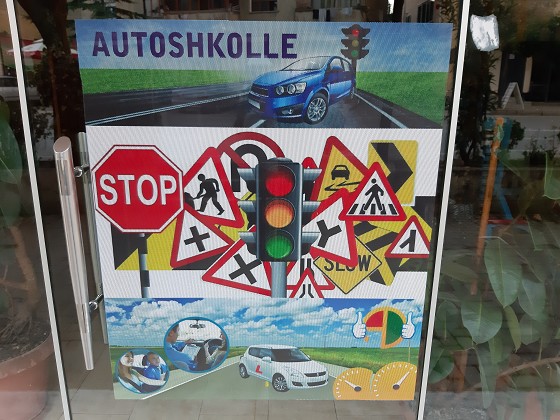
Another thing that has stayed unchanged is the use of brooms made of branches by city workers (a traditional broom of the same type as used by witches to fly with). Also the groups of elderly men who are playing chess, checkers or domino in the park, surrounded by a crowd of supporters and advisors were still there. As well as the gypsy kids begging at the restaurant tables while the people are eating.
My stay in Albania was much too short to draw deeper conclusions. For that reason no Top/Fiasco lists.
